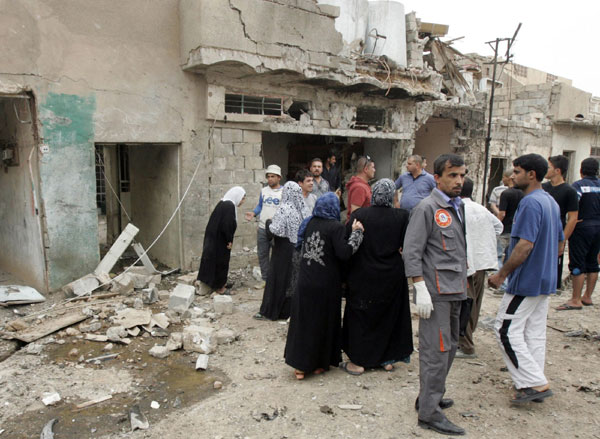Bombs kill more than 35 across Iraq
Updated: 2013-05-16 10:21
(Agencies)
|
||||||||
 |
|
Residents gather at the site of a bomb attack in Kirkuk, 250 km north of Baghdad, May 15, 2013. [Photo/Agencies] |
BAGHDAD - Bomb attacks in Shi'ite areas of Baghdad and in northern Iraq killed more than 35 people on Wednesday, following weeks of violence by Sunni Islamist insurgents determined to unleash sectarian confrontation.
Tensions between minority Sunni Muslims and the Shi'ites who now lead Iraq are at their highest since US troops pulled out in 2011, with relations coming under more pressure by the day from the largely sectarian conflict in neighbouring Syria.
A string of car bombings hit Shi'ite neighbourhoods across the capital Baghdad on Wednesday evening, including one outside a cafe and another at a market, killing at least 22 people and wounding dozens more, police said.
"I saw a bright flash followed by a strong explosion that shook the building. Glass was shattered everywhere, people immediately ran to the scene and started evacuating the wounded and the dead," said Jabar al-Rubaie, a policeman at the scene in Sadr City district in Baghdad.
One channel broadcast images from the capital's Zaafaraniya district, where many houses were partially damaged and several cars were in flames. Ambulances evacuated victims and a man ran holding a wounded child.
Earlier, 10 people were killed when two car bombs exploded near government buildings in the ethnically mixed oil city of Kirkuk.
A suicide bomber on a motorcycle also blew himself up near a police patrol in northern Baghdad, killing at least two officers, while a roadside bomb killed a policeman in a town near Mosul, 390 km to the north, police and medical sources said.
Relations between Iraq's Shi'ite, Sunni and ethnic Kurdish communities have come under growing strain since the last US troops left in December 2011.
The coalition government, split among Shi'ite, Sunni and Kurdish political blocs, is hobbled by disagreements about how to share power.
But the conflict in neighbouring Syria, where mostly Sunni rebels are trying to oust President Bashar al-Assad, who follows the Alawite offshoot of Shi'ite Islam, has also put pressure on Iraq's delicate intercommunal balance.
Although violence is well below the height of sectarian slaughter in 2006-7, when tens of thousands were killed, Sunni Islamist insurgents now carry out attacks almost daily to try to undermine the Shi'ite-led government.
Al-Qaida's local wing, Islamic State of Iraq, and other Sunni insurgents are trying to use Syria's war to gain legitimacy and tap into frustrations among Iraqi Sunnis, hoping to regain ground they lost during their long battle with American troops.

 Michelle lays roses at site along Berlin Wall
Michelle lays roses at site along Berlin Wall
 Historic space lecture in Tiangong-1 commences
Historic space lecture in Tiangong-1 commences
 'Sopranos' Star James Gandolfini dead at 51
'Sopranos' Star James Gandolfini dead at 51
 UN: Number of refugees hits 18-year high
UN: Number of refugees hits 18-year high
 Slide: Jet exercises from aircraft carrier
Slide: Jet exercises from aircraft carrier
 Talks establish fishery hotline
Talks establish fishery hotline
 Foreign buyers eye Chinese drones
Foreign buyers eye Chinese drones
 UN chief hails China's peacekeepers
UN chief hails China's peacekeepers
Most Viewed
Editor's Picks

|

|

|

|

|

|
Today's Top News
Shenzhou X astronaut gives lecture today
US told to reassess duties on Chinese paper
Chinese seek greater share of satellite market
Russia rejects Obama's nuke cut proposal
US immigration bill sees Senate breakthrough
Brazilian cities revoke fare hikes
Moody's warns on China's local govt debt
Air quality in major cities drops in May
US Weekly

|

|







